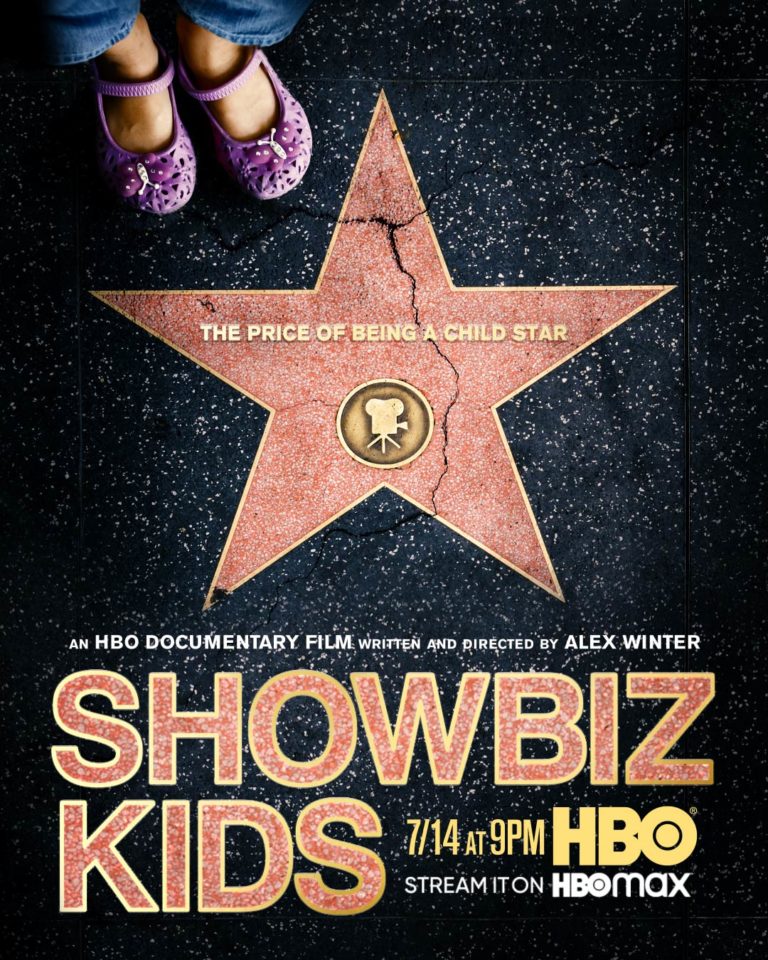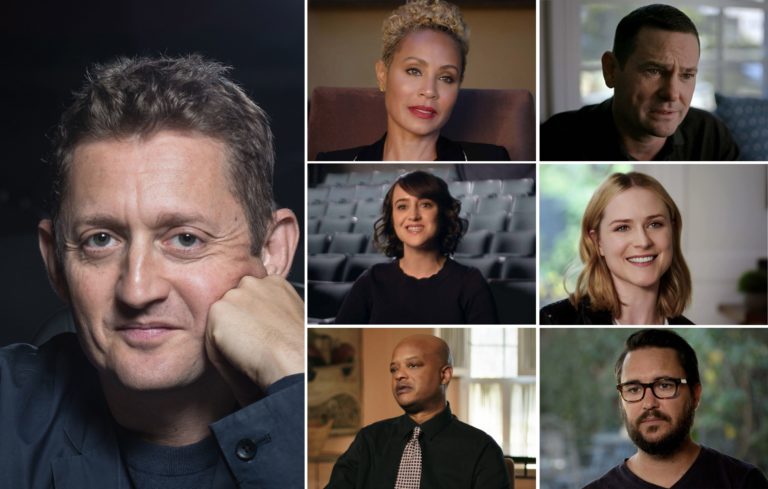That’s Show Biz, Kids
By: Theresa Krakauskas

In an age when (hopefully) we are more woke than ever, it’s no surprise Alex Winter chose to make Showbiz Kids. Yes, that Alex Winter. Otherwise known as Bill S. Preston, Esq. from the Bill & Ted movies. Before he took off in a phone booth time machine at the age of 24, Winter spent many years as a successful child actor, performing in Broadway shows. After graduating from Tisch School of the Arts at NYU, Winter moved to Hollywood, and co-directed a number of short films and music videos. Continuing to work in acting, after the success of Bill & Ted’s Excellent Adventure, he developed The Idiot Box for MTV, as well as a feature film, 1993’s Freaked. While not widely released, it got positive reviews, and has become a cult favorite. Winter returned to directing in 1999 with Fever, praised by the New York Daily News, who called it “a claustrophobic mind bender.” His latest documentary, Zappa, is scheduled to be released on DVD and VOD this coming Thanksgiving weekend.
Showbiz Kids, now on rotation on HBO, examines the impact of child stardom through interviews with a variety of former child stars. Among the topics discussed are abusive situations (sexual and otherwise), stage parent involvement, the difficulty of sudden fame, and the loss of a real childhood. The film also follows young hopeful Marc Slater and mom Melanie on their journey through pilot season in L.A., as well as Demi Singleton, a Broadway veteran and television actor, whose mom accompanies her during the audition process. While the subject isn’t a new one, what Winter brings to the table are the performers telling their own story in their own words, without outsiders adding their two cents.
The film begins with telling us that out of 20,000 auditions, 95% of children don’t book a single job, setting us up to hear what a tough road it is to hoe. The story is as old as the advent of film itself, and Winter wanted to go back to its beginnings. Diana Serra (“Baby Peggy” of silent films), who began work in 1920 at the age of two, speaks about everything from not knowing there was an outside world to being physically endangered. Serra said, “It was hard work. People said, ‘she’s a genius.’ My only genius was that I stayed on my feet.” Her career was over at age seven, when her father got in an argument with the studio over money. She never again had the success she’d had as a child, and felt like “a senior citizen at age 15.” Eventually, she changed her name, had a child with her second husband, and found success as a non-fiction writer. At age 99, in 2019, she self-published her first novel, The Drowning of the Moon, giving all late bloomers hope.
Back in the day, many child actors never received the money they earned, often supporting their parents expensive tastes. Jackie Coogan, best known as the original Addam’s Family’s Uncle Fester, was also a silent film star as a child. Out of nearly $4 million in earnings, he saw today’s equivalent of $2000, his mother maintaining that, until he was 21, every penny belonged to his parents. At the age of 24, Coogan sued his parents, resulting in the California Child Actor’s Bill (commonly known as The Coogan Act), assuring money earned remained the legal property of the minor child.
Directors were often abusive in trying to get children to emote. Jackie Cooper probably had the most notable experience, which he chronicled in his memoir, Please Don’t Shoot My Dog, referring to a psycho-manipulative tactic that had been used on him as a child. Shirley Temple, along with other children of her day, were cast in the creepy Baby Burlesk shorts, starring hyper-sexualized toddlers playing prostitutes, drunks, and disparaged veterans. According to historian and author John Kassan, the conditions on the set of Baby Burlesk were horrifying, director Charles Lamont punishing uncooperative children by locking them in a small black box, and making them sit on a block of ice. Kassan said, “Those who told their parents about this torture were threatened with further punishment.”
Even after laws came along to protect children, the road was still strewn with pitfalls; a road that runs through an adult world. Winter wanted to make Showbiz Kids a decade ago, but found potential investors were “interested in a more salacious, tabloid approach to the story, which [he] did not want to do.” Instead, he interviewed former child actors that had a mix of experiences, bringing to our attention abusive situations that an adult might not perceive as such.
Among those interviewed, Disney kid Cameron Boyce had the easiest time of it, protected by the franchise. At first, he had so many rejections, he wondered why he kept being pulled out of school just to fail, but at 11 years old, he was cast in Disney’s Jessie. Like many of the participants, moving into his teen years presented difficulty. He said, “You’re everyone’s idea of what they want you to be, when you don’t know yet yourself, and your adolescent life is documented for everyone to see.”
Henry Thomas (E.T.) got into the business when his piano teacher, also the director of a local community theater, suggested acting, and he thought it would get him out of piano lessons. By the time he was 13, he wanted to be “normal,” but was teased at school, and realized he was always going to be “that guy.” By 17, he got the feeling his mother resented him, saying, “when you’re a kid, you don’t think about what others have to do to accommodate you.” When she was labeled difficult, he was too. As he grew older, he noticed that people expected him to still be a child, and weren’t looking for the teen he was now, but the kid he was in E.T.
Milla Jovovich hated acting from the jump. Her mother had been a movie star in the former Soviet Union, and after moving to the United States, took a job as a housekeeper for a big director. Jovovich believed her mother thought the famous people who frequented the director’s house would see she was one of them and change her status. When that didn’t happen, she decided Milla was her ticket out. In an adult acting class at the age of nine, the days were long, but for Jovovich, being photographed was more traumatizing than filming. People freaked out over her pictures, saying she looked like a little Lolita, about which Jovovich said, “They’d never get away with that today.”
Jada Pinkett Smith spent her Saturdays and after school time learning various skill sets involving the arts. She said the business could be intimidating, and she was glad she’d had adversity in her life before going to Hollywood, saying, “After surviving the streets of Baltimore, Hollywood felt like Disneyland.” Although if she’d had to cultivate a career today, she doesn’t know who she would have become, because of the pressures of social media alone. She’s seen people lose sight of what’s important when fame, money, and glamor are dangled in front of them. Even her own daughter Willow asked her and Will to pull back after Willow’s hair became a celebrity on its own. (This film was made before the recent resurfacing of a video where influencer Shane Dawson talked about objectifying Willow, at the time eleven years old.)
Wil Wheaton’s mother wanted to be in the business herself, and decided to live through her child, thinking only of her own needs and not what was best for him. Spending nearly every day going to auditions, he did well in commercials, but when a director became abusive, decided he’d rather do films. After having success with his first effort, A Long Way Home, his parents put him in a bad horror movie, The Curse, because a large amount of money was thrown at them, as well as a trip to Rome. It was an abusive environment, and a terrible experience, along with hurting his career. Film critic Roger Ebert hated him, and he took it personally, saying, “People forget that they’re talking about a child who’s given up their childhood.” Stand By Me turned things around, as director Rob Reiner taught the kids technique, and told them to just be kids and stop overthinking it. Wheaton believes one of the reasons the film was a success was because it connects honestly with the audience. When Star Trek: The Next Generation came along, Wheaton suddenly stopped being a kid actor, and became a child star. Changing his life fundamentally, there was the sudden expectation for him to discuss things he knew nothing about, as well as being despised by young men who were furious that he was on their sci/fi show. He hated being a teen idol, even though adults told him that he was living the dream. At eighteen, he had the revelation that he didn’t have to do this if he didn’t want to, and that it meant more to his mother than it did to him. He realized he could be his own person, and walked away. He didn’t want to be somebody for whom one day fame is gone, and “they don’t know what to do, and end up on a [crummy] reality show because it’s the only way they know how exist.”
Todd Bridges, most recently in the news because (oh horrors) he had a job at Trader Joe’s, said many of his peers weren’t treated as children, but mini adults. He was grateful that he’d gotten to do real kid things like playing in Little League. At age 11, seduced by an older man, he was crushed when his parents took the man’s side, and it sent him on a path of self-destruction. His father/manager eventually went to prison for ripping off clients, including his son. Bridges said life was even worse for Different Strokes star Gary Coleman, who was made to work the day after he had a kidney transplant, and fantasized about a normal life. Bridges eventually learned life wasn’t fair, and wasn’t going to be, and got his act together. He said, “the person who everyone thought wouldn’t be there was the last one standing,” as co-stars Coleman and Dana Plato are both deceased.
Evan Rachel Wood came from a family of artists, who she described as acting snobs. It wasn’t about getting rich and famous, but about doing great work, and working with great people. Feeling she’d be a disappointment if she didn’t want to do it, part of her still wanted to play and get in trouble. The vibe was that it would be a waste if she didn’t want to pursue acting, and “it was a fulfilling, but lonely, experience.” When her career took off, she knew it was what everyone in her family would have wanted for themselves, so she didn’t discuss her struggles, and never complained. Her emotional state was equated with how well her career was going, so it was assumed she was fine. When she saw a known pedophile win a Golden Globe, she started sobbing, and didn’t know if she could do it anymore. The pressure to be successful went against who she really was, and she realized in her early 20s that she had no life skills. She short-circuited, and took a step back to decide who she was, and what she wanted to do.
Mara Wilson (Mrs. Doubtfire, Matilda) wanted to act, so she could finally stop holding her family captive on holidays with the shows she’d put on for them. From ages four to seven, she was having a lot of fun, and wanted to keep it going, but missed normal kid things, like learning to ride a bike, and didn’t do well in school later on. She was used to people telling her what to do all the time, and became lost when she had to set her own schedule for doing things like homework. As she got older, she just wanted to hang out with her friends, and suffered from imposter syndrome, having to smile at everyone she met. She noticed that older men were interested in her, and while at the time thought nothing of it, not long ago she googled her name – something she warns all of us never to do – and was shocked at the things that came up. Eventually, Hollywood was no longer interested anymore, as she was a cute prepubescent child, but not such a cute teen, and she began self-sabotaging her auditions.
The good news is, each of these actors overcame their early obstacles. They either came back to acting as more well-rounded individuals, and/or branched out into other areas, such as writing or activism, using the experiences they’d had to help others. Winter did a beautiful job in telling their stories in a film that’s not meant to discourage, but to educate, and help others avoid the difficulties these actors had to contend with.
In a sad postscript, the film was dedicated to Diana Serra, who passed away in February of this year at 101, and Cameron Boyce, who also passed away in July 2019 due to complications with epilepsy.



